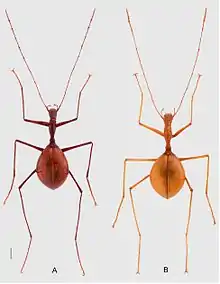Graciliella
Graciliella is a genus of cave beetle in the family Leiodidae.[1] It was previously included in the genus Anthroherpon but DNA evidence showed that it is actually a more distantly related group of species. The paper in which Graciliella was published gained some media attention, with several stories picking up on the spider-like appearance of these beetles.[2] Graciliella currently consists of six species, including the newly discovered Graciliella kosovaci and Graciliella ozimeci All species occur in subterranean habitats of the Dinaric Mountains, from Crvanj mountain (Bosnia and Herzegovina) in the north, to Trnovo (Montenegro) in the south, and from Žaba mountain (Croatia) in the west to Prokletije mountain (Montenegro) in the east.[1]
| Graciliella | |
|---|---|
 | |
| G. apfelbecki and G. metohijensis | |
| Scientific classification | |
| Kingdom: | |
| Phylum: | |
| Class: | |
| Order: | |
| Family: | |
| Subfamily: | |
| Tribe: | |
| Subtribe: | Anthroherponina |
| Genus: | Graciliella Njunjić et al., 2016 |
| Type species | |
| Graciliella apfelbecki apfelbecki (Müller, 1910) | |
| Species | |
|
See text | |
Species
- Graciliella absoloni (Guéorguiev, 1990)
- Graciliella apfelbecki (Müller, 1910)
- Graciliella apfelbecki apfelbecki (Müller, 1910)
- Graciliella apfelbecki scutulatum (Giachino & Guéorguiev, 1993)
- Graciliella apfelbecki schwienbacheri (Giachino & Vailati, 2005)
- Graciliella apfelbecki sculptifrons (Winkler, 1925)
- Graciliella kosovaci Njunjić et al., 2016[1]
- Graciliella lahneri (Matcha, 1916)
- Graciliella metohijensis (Zariquiey, 1927)
- Graciliella ozimeci Njunjić et al., 2016[1]
References
- Njunjić, I., Perreau, M., Hendriks, K., Schilthuizen, M., & Deharveng, L. (2016). "The cave beetle genus Anthroherpon is polyphyletic; molecular phylogenetics and description of Graciliella n. gen. (Leiodidae, Leptodirini)". Contributions to Zoology. 85 (3): 337–359. doi:10.1163/18759866-08503005.CS1 maint: uses authors parameter (link)
- Pappas, Stephanie (September 1, 2016). "Scary Cave Spider? No, They're New Beetle Species". Live Science.